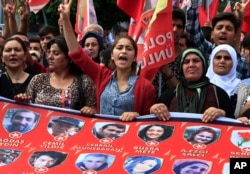Turkey has once again arrested a man it describes as the national leader of the Islamic State group, but Turkish media say the suspect is the same person who was arrested multiple times in the past but released from custody in each case.
Halis Bayancuk, also known as Abu Hanzala, was charged in the past with involvement in alleged terrorist attacks and with recruiting extremists for training abroad. He has been detained at least a half-dozen times since 2009, only to be freed because of a lack of evidence or problems involving the charges against him.
Bayancuk was detained Wednesday for allegedly making threats against the Ankara governor’s office in a recent online video. Media reports say he was taken into custody in Istanbul’s Bagcilar district and moved to a prison facility Ankara, the capital.
VOA’s Turkish Service reports that the Ankara prosecutor’s office has prepared an indictment charging Bayancuk with insulting Turkish government leaders.
The menacing remarks he is said to have made came after Turkish authorities canceled a speech he was planning to give February 26 in Ankara’s Etimesgut district.
Outspoken supporter of IS
After his speech was canceled, Bayancuk said, “We consider this a threat. We will see what will happen here and also in the afterlife.” He also denounced staff at the governor’s office as “nonbelievers.”
Fliers and banners prepared before Bayancuk’s scheduled speech describe him as “the fearless man who introduced Islam to thousands of people.” He has long been an outspoken supporter of Islamic State and is awaiting trial on terror charges pending against him since July 2015, when he, his wife and three other alleged IS supporters were detained in connection with a suicide bombing claimed by IS that killed 31 people in southeast Turkey.
Bayancuk also had been part of what was said to be the largest prosecution ever of Islamic State members in Turkey — 94 suspects — but he was one of eight imprisoned defendants freed a year ago by a court that ruled they should be released because of “the state of the evidence [against them] and time already served in prison.”
Human-rights groups say the release of IS suspects charged with serious acts of violence contrasts with Turkey’s treatment of thousands of Kurdish activists the state has been holding in custody since a coup attempt last July, even though their pretrial detention involves no allegations of violence.
Bayancuk first drew national attention when he was arrested by the Turkish National Police for sending teenagers to receive training at al-Qaida camps in Afghanistan. He is alleged to have been one of the planners of synagogue bombings in Istanbul in 2008 carried out by that terror network, but he was released in May 2009 because of a lack of evidence.
In 2011, Bayancuk and 50 alleged al-Qaida members were arrested in a roundup of suspected terrorists, but he was again released in January 2013 because of a lack of evidence.
Switched allegiance from al-Qaida to IS
In 2014, he was detained during another al-Qaida roundup and named by authorities as the leader of Turkish al-Qaida. He was charged with facilitating passage of foreign and Turkish fighters to Syria and providing weapons and logistical support to extremists, but once again was released.
Bayancuk was freed after several police officers and prosecutors involved in the case against him were dismissed for allegedly plotting to overthrow President-elect Recep Tayyip Erdoğan. The long-serving prime minister (2003-2014) won the presidency in a first-ballot victory two weeks before the alleged coup attempt.
After leaving prison in 2014, Bayancuk reportedly established ties with the Islamic State group, then emerging as a factor in Turkish politics and delivered a sermon urging Muslims to support the extremists.
Bayancuk has been identified as Islamic State’s leader in Turkey by a number of analysts, including Anne Speckhard, director of Georgetown University’s International Center for the Study of Violent Extremism. Turkish media have reported on articles signed by Bayancuk that appeared in pro-IS outlets, and Turkish intelligence reports say he recruited fighters to join IS.
The Turkish government has endured blistering criticism in recent years for the way in which Islamic State has grown in strength domestically. The group is reputed to have built a national network that smuggles IS recruits from across the globe into neighboring Iraq and Syria.
Both foreigners and Turkish nationals have been detained in a number of crackdowns on IS, but experts say many jihadists were subsequently released — even suspects with an extensive record of previous arrests — in what has been dubbed a revolving door policy. Turkish media reported one of the suspects detained for a deadly New Year’s Day attack on an Istanbul nightclub had been picked up last year and scheduled for deportation, but instead was let go.
In recent weeks, Turkish officials say they have increased their efforts to suppress IS. Police have been breaking down the doors of suspected IS members and reportedly have detained more than 700 people nationwide during the past month.





